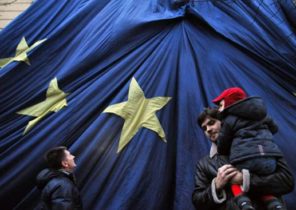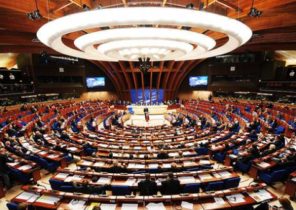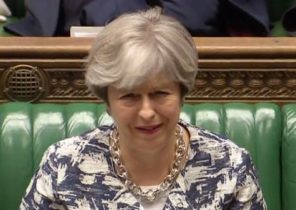
Former European Commissioner and WTO Director General Pascal Lamy (Pascal Lamy) has released together with geopolityka Gnesotto Nicole (Nicole Gnesotto) book, “Where rolls the world?” On the background of Breccia and attacks trump, he believes that Europe needs to rethink itself and to form a future-oriented community.
Le Point: Until recently you were an advocate of “happy globalization”, but, judging by your book, your optimism has evaporated… You sided with Jean-Luc Mélenchon?
Lamy: no, and contrary to the myths I was never a supporter of “happy globalization”, as you say. It has positive and negative sides as capitalism, which it is, in fact, serves as a new name. It needs to be kept under control. I worked to ensure that economic relations were regulated by international rules and organizations. We are not talking about creating obstacles or connivance, and on the regulation. That uncontrolled globalization in the financial sector caused the 2008 crisis. This crisis resulted in disastrous consequences for many countries in economic and social terms, but at the same time became the saving event. He proved that in the conditions of deregulation and liberal euphoria after the collapse of the Soviet bloc markets were capable of the worst.
Why? The crisis of 2008, the effects of which we have to deal with to this day, was primarily a result of the lack of global regulation, which is superimposed and the decline of the welfare state. Western nation-States could not (though some of them get out of situations better than others) to cope with the impact of the crisis on the population and the growth of inequality. All this has led to increased among the Western middle-class fear to lose their status, lose situation. And this gave rise to the populist movements in Europe and the United States. At the same time, there can be seen the reverse movement in the culture that we are trying to parse along with Nicole Gnesotto.
— Are you satisfied with the trial of globalization?
Not quite. Worries me is not the globalization of the economy. Waste ago, protectionism would entail, crises, wars, unrest and decline. I write that the outcome of globalization over the past 20 years has not been a peaceful movement. The good side is that a significant number of people across the planet have been lifted out of terrible poverty. If in 2010 the middle class in the world had 2 billion people, by 2030 there should be 5 billion. Two-thirds of the growth will be in Asia. Globalization has contributed to interdependence of Nations and thus prevented conflicts. If the relationship between China and the United States worsen, Beijing could use the fact that it has a huge number of us bonds, which could be a blow to the dollar. Washington may remind you that he will repay the debt to Chinese creditors, and that, if these flows are interrupted, the Chinese have much to lose. The bad side is, of course, lies in the growth of inequalities. If you put aside the middle class, the rich got richer, incredibly rich, and the poorest, those left behind intensify trade relations have become even poorer. Another negative consequence is the return of nationalism, fear, and extremism in a democracy. Like many people around me, “globalized elite”, some would say I have too long believed that the economy is above politics. Geopolitical Nicole Gnesotto, in turn, has long been considered otherwise.
— What you want to say?
— The rise of trump, Putin, Erdogan and Duterte in Asia, as well as the phenomenon of DAISH say that the economy is not always dominate politics. This is my mea culpa. Today we live in a troubled world. We observed phase, which will last only a few years, or the beginning of a long cycle? It’s still hard to say. Considering the world’s key figures and issues, we provide the arguments are laying the foundations of understanding, clarifies the situation. Readers must themselves write their opinions. However, the reality is: the world is gaining momentum, the dynamics of aggression and decay. I sincerely believed that the economic interdependence of States will save us from the annexation of the Crimea, Breccia and isolationism trump. I was convinced that the force of globalization will save us from such adventures.
— A return to the 1930-ies?
— I don’t think. I think ultimately globalization, that is, the interdependence of the production systems have advanced far enough to protect us from the conflict opposite movement. The forces of progress, there is still a chance. At the same time, we should note one important fact: although the economy and its technical infrastructure is globalised, policy remains localized. We vote for the election of the political leadership, the adoption or rejection of laws and agreements, not technological leaps. This contradiction fully manifests itself in the US and the UK. Anyway, we should not forget that major inter-state conflicts and hotbeds of terrorism have on the geographical areas that are the weakest integrated into the world economy, remained at the periphery of global development. We should compare the maps of the WTO with trade links and maps UNHCR indicating the conflict. They complement each other: conflict zones appear in the most remote from transnational economic flows.
— Trump welcomes Brakcet and declares war on Europe and NATO… We are doomed to its infinite attacks?
— The phenomenon of trump really is increasingly worrisome. Constraining leverage in the American government was weaker than we thought. Congress, justice, the press, Democrats and even the business was not able to keep trump and his team… In terms of the multilateral system, organizations like the UN and WTO is under threat of US withdrawal which would deprive them of a safety role.
— What can Europe against trump?
— She needs to act, and quickly. Should respond not only to Brussels, and all, every player. I was just amazed that in the primaries of the left and right international issues were given only a few minutes. And in the form of a caricature: “Should I be friends with Putin?” Politicians today need to say that the world has changed, that is now written and said that we should offer the manner of its writing. We Europeans can take a pen and give strength to our project and values. We have no reason to be ashamed. It needs crisis world.
— Easy to say when one of the partners of the EU, and not of the smaller, decides to leave, slamming the door…
— In the case of Breccia debates around sovereignty crushed by rational economic thought. Everything will be much more complicated than simple divorce. To join the EU then add the egg in the omelet. And it’s not easy, as evidenced by a series of extensions. Brakcet means that scrambled eggs need to remove the egg. It will last years and in this period it is necessary to strengthen shaky European Union. This requires that the European project has become more politics and imagination. It’s time to end prohibition and power to make Europe a geopolitical, not just economic power.
Lamy’s plan for Europe after Brescia
For 60 years Europe has gone through a lot of difficulties and crises. They did not stop her to always go forward, to become stronger and to grow. Today Europe for the first time in the history of the farm. I mean, she abandoned historic challenge. Breaksit is likely to deprive the EU of the fifth world power. (…)
Can Europe continue to claim the pioneering role of regional integration, which serves as a source of inspiration for other regions of the world become multipolar? Precisely this question arose after Breccia. (…) It is necessary to urgently take the necessary measures to reduce the cleft between the frustrated public opinion and impersonal public-political space. Erasmus curriculum for millions of young Europeans. Investment program with a five-fold increase in the plan of the European Commission Juncker. Harmonization of tax systems, even with the departure from the unanimity rule, through the adoption of appropriate agreements two or three main Eurozone countries. Accelerating the pace of Europeanization in EU foreign policy. The allocation of more tangible part of the European budget for innovation and research. Such a program can give tangible results in the short term, and is the best remedy for tetanus, which can cause poison Breccia.
All these disturbances and crises, as well as the answers (or lack thereof) with the European Union lead us to the following conclusion: “narrative” on which was based the European project had become obsolete. He fails to reach the great enterprise which had formed after the war and against all wars. To pererastet maps of European construction, to come up to Europe a new project and a narrative in accordance with the new century, to draw out a new path — these are the initiatives we need to take to regain energy, strength and scope of Europe, which goes astray, although we need now more than ever.







